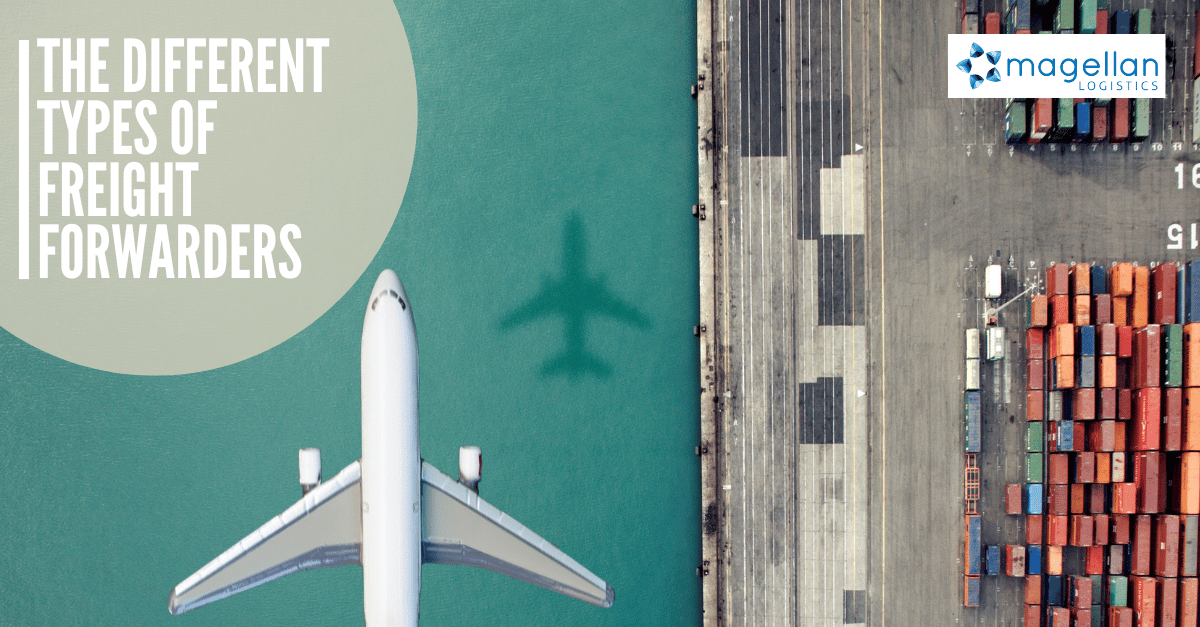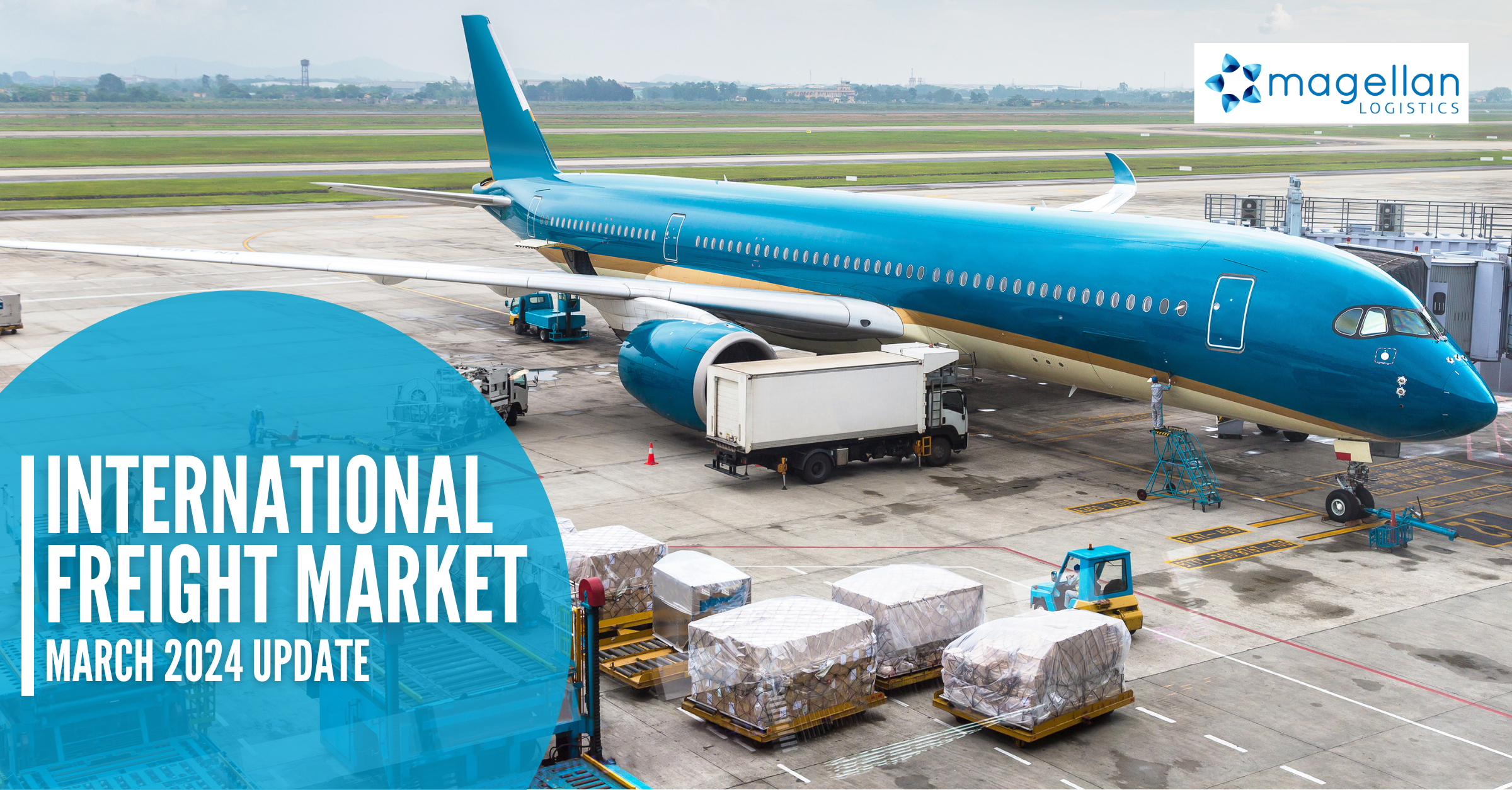Freight forwarders are essential partners in the logistics industry, responsible for ensuring that goods are transported efficiently and effectively from one place to another. The different types of freight forwarding services available cater to specific transport requirements and routes, and understanding these variations can help businesses make informed decisions when selecting a freight forwarder.
Types of freight forwarding
Below are details of the different types of freight forwarders, including Air Freight Forwarding, Sea Freight Forwarding, Road Freight Forwarding, Rail Freight Forwarding, Multi-modal Freight Forwarding, and Customs Brokers.
1. Air freight forwarding
Air freight forwarding involves the shipment of goods via air. It is one of the fastest modes of transportation, making it ideal for cargoes of small dimensions, high value, time-sensitive or perishable.
Two methods of air freighting your goods are direct and deferred services. A direct flight is, as the name suggests, when your freight is loaded on a scheduled flight from the airport of origin to the final destination. When you choose a deferred service, your goods are carried from the point of origin to another country, where the cargo is off-loaded and then reloaded onto a flight scheduled for its final destination. For example, Malaysian Airlines loads cargo destined for Sydney in Shanghai and air freights it to their home base in Kuala Lumpur. Here it is discharged off the first flight and loaded onto the next available flight from Kuala Lumpur to Sydney.
Air freight forwarders typically have established relationships with airlines, allowing them to negotiate competitive rates and secure priority space for their clients’ shipments. They also handle all aspects of air freight logistics, including documentation, customs clearance, and delivery to the final destination.
2. Sea freight forwarding
Sea freight forwarding involves the transportation of goods via ocean vessels. It is economical to ship large quantities of goods over long distances.
When shipping containers, some of the options are:
- Full Container Load (FCL) the container is packed by one supplier to one consignee.
- Full Consolidation (FCX) cargoes from different vendors are consolidated into one container for delivery to one consignee.
- Less than Container Load (LCL), where your shipment doesn’t fill a container, a consolidator will group cargoes for various consignees into a Full Container Load.
Another option for shipments that won’t utilise the entire volume available in a standard container is to use a reefer container for General Cargoes. As reefer containers have refrigeration units built into the container, the internal capacity is less than a standard container.
As some countries are net importers of frozen and refrigerated goods, the shipping lines will find that they have reefer containers they want to redeploy but cannot find any refrigerated cargo for the return journey.
They sometimes offer discounted freight rates on Non-Operating Reefers (NORs) for General Cargoes, so they are not shipping them empty when repositioning them. There are some restrictions on cargo types and availability dates of NORs.
When you engage Magellan Logistics, you can consolidate LCL shipments from various suppliers into a single FCL.
The advantages of consolidating loads include the following:
- The shipments are charged as one FCL rather than multiple LCL shipments.
- Goods are delivered together rather than in multiple LCL deliveries.
- Your shipments are in one exclusive container rather than sharing a container with unknown importers.
- You receive your goods more quickly because FCL containers are delivered directly, while LCL containers pass through a customs bond.
You can also ship your goods directly or with a trans-shipment service. With a direct shipment, your cargo remains on the same vessel from the loading port until the discharge port. This type of shipment is quicker but carries a premium price.
A trans-shipment occurs when your cargo is carried from the loading port to a third country, where it is loaded onto another vessel for carriage to the discharge port. While this option is less expensive, shipments can be delayed if they miss the connection, so it is best used when delivery is not time crucial.
Sea freight forwarders are responsible for negotiating contracts with ocean carriers, booking cargo space, and arranging for the loading and unloading of goods at ports. They also handle all documentation and customs clearance requirements.
3. Road freight forwarding
Road freight forwarding involves transporting goods in vehicles like trucks or vans. It is a popular mode of transportation for goods that need to be shipped domestically or within a region. Road freight forwarders handle all aspects of road transportation, including route planning, cargo tracking, and delivery to the final destination.
They also arrange for customs clearance and documentation for international shipments. Road freight can be especially useful at origin for transporting cargo from a supplier to a faster port in another country.
4. Rail freight forwarding
Rail freight forwarding involves the transportation of goods via rail networks. Shipping goods over long distances is economical, particularly for heavy or bulky cargo. Rail freight forwarders have established relationships with rail carriers, allowing them to negotiate competitive rates and secure priority space for their clients’ shipments. They also handle all aspects of rail logistics, including documentation, customs clearance, and delivery to the final destination.
5. Multi-modal freight forwarding
Multi-modal freight forwarding involves transporting goods via multiple modes of transportation, such as sea, air, road, and rail. It is an efficient way of shipping goods over long distances or across several borders. It allows for a combination of transportation modes best suited for each leg of the journey.
Magellan specialises in multi-modal freight forwarding.
For example, an Air/Sea option from Europe, India or China suits non-urgent air freight or urgent sea freight and can reduce the overall transportation costs by up to 50% and cut transit times in half.
Air/Sea is more cost-effective than air freight and provides better transit times than ocean freight. It retains all the value-added services standard to our air freight service with substantial savings on the overall transportation costs.
Multi-modal freight forwarders are experts in managing the entire supply chain, from the initial pick-up of goods to the final delivery. They handle all documentation, customs clearance, and cargo insurance requirements.
6. Not exactly a type of freight forwarder – customs broker
Whether by sea or air, once goods arrive in Australia, it is advantageous to both the importer and the wharves and airport depots to clear the goods through customs and DAFF as quickly as possible. In fact, importers have three clear days to collect their goods from the wharf before storage fees apply. Knowing what’s required is essential to minimising charges and eliminating extra fees.
That’s where an experienced customs broker like Magellan Logistics can ease the stress of importing goods. In simple terms, Magellan Logistics, like other customs brokers, helps importers clear goods through government agencies and into the Australian marketplace.
Magellan has a corporate licence and employs licensed brokers who can assess customs documents, determine the correct duty and import GST information, and advise on concessions or reduced rates in duty or other government charges that may apply to your shipment.
Customs brokers are responsible for ensuring that goods are cleared through customs and comply with all relevant regulations and laws. They act as intermediaries between the shipper and customs authorities, facilitating the smooth movement of goods across international borders. Brokers are also licensed to evaluate quarantine documents.
Understanding the different types of freight forwarders is essential for businesses that rely on the transportation of goods. Whether shipping domestically or internationally, by air, sea, road, or rail, there is a freight forwarding service that can meet specific requirements. Multi-modal freight forwarding provides an efficient and comprehensive solution for complex logistics challenges, while customs brokers ensure compliance with all relevant regulations and laws.
By partnering with a reliable and experienced freight forwarder, businesses can ensure that their cargo – the lifeblood of their operations – arrives safely, in full, on time and is customs compliant.
Magellan Logistics provides freight and logistics services to all industries, including sea freight, air freight, customs clearance and the all-important digital freight portal providing 24/7 visibility of all your shipments. Get in touch with one of our freight specialists on 1300 651 888.













